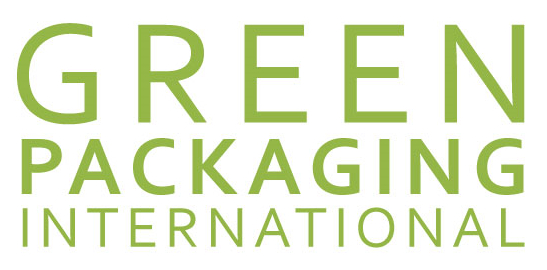Super User
Rockwell Automation Expands Kinetix 5100 Servo Drive and TLP Motor Pairing to 480V
The Rockwell Automation Kinetix 5100 servo drive and Kinetix TLP servo motor standalone motion solution is now available in 480V for use in a wider range of OEM applications for packaging, converting, print and web, machine and assembly, and life sciences.
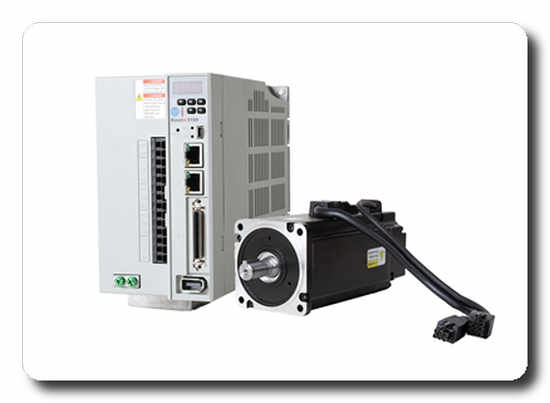
The Kinetix 5100 servo system meets growing consumer demand for more product variety by providing a market-competitive motion-control offering for flexible, standalone machines. Using the Kinetix 5100 servo drive, OEMs can create a motorized or automated system that can help speed up changeovers.
Additionally, with built-in safe torque off, users can remove motor torque without removing power from an entire machine. This allows a machine to restart faster after it has reached a safe state. Dual-port EtherNet/IP also supports device-level ring (DLR) topologies.
Why manufacturing environmentally friendly packaging and paper is essential for the future
As a new age of consumer behaviour emerges, and governments are distracted by the pandemic - environmental concerns have fallen from the political and public agenda.
The dramatic increase in e-commerce and home deliveries has caused a sharp rise in packaging waste, which comes with high environmental costs. At current rates, 12 billion metric tons of plastic waste will end up in landfill and the natural environment by 2050[1]. As countries experience further restrictions on movement and a second wave of Covid-19, consumer behaviour is unlikely to rapidly revert to its pre-lockdown state.
Hence, sustainable packaging and paper solutions must be adopted so the global community can protect the planet effectively. There is no time to waste.
 Plastics are the most common and wide-ranging materials used for packaging. They are central to FMCG and global industrial supply chains, protecting goods in transit and extending their shelf lives. Their ubiquity means a serious plastic packaging waste crisis must be addressed before irreversible damage is done.
Plastics are the most common and wide-ranging materials used for packaging. They are central to FMCG and global industrial supply chains, protecting goods in transit and extending their shelf lives. Their ubiquity means a serious plastic packaging waste crisis must be addressed before irreversible damage is done.
According to the UN, 300 million tonnes of plastic waste are produced every year. Since the early 1950s, 8.3 billion tonnes of plastic has been produced and c. 60% has ended up in landfill or the natural environment[2].
Plastic waste is a primary contributor to global ocean pollution with rivers carrying waste from far inland to the sea. Each year, eight million tonnes of plastic ends up in the world’s oceans and 100 million marine animals die from entanglement, ingestion, or interaction with this waste[3]. The Ellen MacArthur Foundation estimates that, by 2050, there could be more plastic than fish in the sea[4].
The issue extends beyond the environment; plastic waste comes with a significant human cost. In 2019, Tearfund, Fauna & Flora International and Waste Aid reported between 400,000 and one million people die each year from preventable diseases linked to mismanagement and burning of plastic waste in developing countries[5].
Plastic waste pollution also impacts people’s livelihoods and the economic development of developing countries. The UN Environment Programme reports ocean-based plastic pollution has an annual economic cost of US$13 billion due to revenue losses in fisheries, agriculture, and tourism[6].
We have a collective responsibility to tackle this plastic pollution crisis. The environmental and human toll is too great to ignore. Sustainable alternatives to traditional packaging and paper exist. It is time for multinationals, manufacturers, and retailers to integrate them into their working practices to help reduce global pollution; protect marine and wildlife species; and those in developing countries.
The growing consumer awareness of this crisis is promising. A recent study of 2,000 UK shoppers revealed 62% are thinking more about sustainability now than five years ago and increasingly looking for environmentally friendly options[7].
Popular culture is also playing a major role in raising awareness of packaging choices. Notably, David Attenborough’s ‘Blue Planet II’ series focused on ocean waste and triggered a passionate global response. Consumers are more aware nowadays that a product’s lifecycle does not end after consumption – rather after its proper disposal.
Nonetheless, the pandemic and the new normal means individuals are more reliant on e-commerce and delivery services than ever before. Manufacturing environmentally friendly packaging and paper is therefore essential. It will help protect the planet and maintain business profitability as consumers increasingly look for eco-friendly choices.
Political and tax incentives for incorporating environmentally friendly packaging and paper are also evident. From 1 January 2021, the EU will tax non-recycle packaging waste through national contributions. In April 2022, the UK will introduce a tax on plastic packaging containing less than 30% recycled content. These plastic reduction policies and public appetite make environmentally friendly packaging and paper attractive for business.
Manufacturing environmentally friendly packaging and paper is vital for the future – on an environmental, human, and corporate level. There is no time to waste.
[1] https://www.ncbi.nlm.nih.gov/pmc/articles/PMC7324921/
[2] https://www.unenvironment.org/interactive/beat-plastic-pollution/#:~:text=A%20staggering%208%20million%20tonnes,cities%20to%20the%20marine%20environment
[3] https://www.condorferries.co.uk/marine-ocean-pollution-statistics-facts#:~:text=100%20million%20marine%20animals%20die,by%20North%20Pacific%20fish%20yearly.
[4] https://www.ellenmacarthurfoundation.org/assets/downloads/New-Plastics-Economy_Catalysing-Action_13-1-17.pdf
[5] https://wasteaid.org/wp-content/uploads/2019/05/2019-Tearfund-Consortium-No-time-to-waste-En.pdf
[6] https://wasteaid.org/wp-content/uploads/2019/05/2019-Tearfund-Consortium-No-time-to-waste-En.pdf
[7] https://www.talkingretail.com/news/industry-news/time-to-prioritise-eco-friendly-packaging-say-shoppers-in-new-survey-13-10-2020/#:~:text=The%20study%20of%202%2C000%20shoppers,a%20barrier%20for%20many%20consumers.
first naturally biodegradable plastic packaging alternative containing graphene
UK biotech company Toraphene is preparing to unveil the world's first truly biodegradable, compostable and commercially viable alternative to plastic packaging.
The company has developed a new material, also called Toraphene, that uses biopolymers that compost naturally and biodegrade without human intervention, even in the ocean.
The biopolymers are combined with Nobel Prize-winning graphene, which is derived from carbon and is stronger than diamond at an atomic level.
While biodegradable plastics currently exist, they rely on commercial composting, which uses energy to heat the compost, as well as presenting other logistical challenges. For example, in 2019, the BBC found that compostable plastics in Wales were going to landfills rather than being composted because almost all local councils were unable to deal with them.
In addition, some bioplastics produce methane gas when they decompose, a compound with a global warming potential 25 times that of CO2. Toraphene can be optimized to mostly produce CO2 along with mulch that can be used to fortify topsoil.

“Amidst a climate crisis, plastic waste is known to be a huge, global problem and many plastic alternatives now exist, so why don’t we see them everywhere?”, asks Gaute Juliussen, CEO and Founder of Toraphene. “It’s because they need specific manmade conditions to biodegrade, and many degrade into microplastics, which contaminate our oceans and food chain for centuries”.
Such bioplastics have “effectively been ‘greenwashed’ and mis-sold to environmentally responsible consumers and companies,” continues Juliussen. “They also tear easily, shorten the shelf-life of the contents they contain and cannot be produced economically at scale”.
Due to the addition of Graphene, Toraphene has been shown to be stronger, thinner, and less permeable than alternatives, improving food safety and shelf-life. This presents the first commercially viable alternative to plastics.
An entrepreneur, venture capitalist and former Associate Professor of Business, Juliussen founded Toraphene in 2018 with the initial aim of creating a green alternative to carrier bags and food and drink containers. Such plastics make up 23 percent of marine waste.
Birgit Liodden, founder of The Ocean Opportunity Lab, said: “Toraphene has the potential to create a critical turning point in tackling the global plastic pollution crisis. We all know how pressing the climate crisis is, and plastic pollution is a huge problem, particularly in our ocean environments. I’m very heartened by the prospect of Toraphene, which should be a transformative step in tackling plastic pollution and play a huge role in making the world’s oceans plastic-free”.
Ahead of the launch of Toraphene, which is patented in the UK, EU, and the US, Juliussen is launching an equity crowdfunding campaign on Crowdcube, encouraging anyone who cares for the environment to be part of the Toraphene journey.
Toraphene is renting production equipment from plastic bag manufacturers and plugging directly into existing supply chains. The company is already in talks with major consumer brands, retailers and food packaging suppliers.
Ultimately, Toraphene aims to render plastic packaging obsolete and disrupt the $4 trillion plastics industry.
About Toraphene
Toraphene is the world's first fully biodegradable, compostable and commercially viable alternative to plastic bags and packaging. This natural material is stronger, thinner, and less permeable than alternatives, and improves food safety and shelf-life.
Toraphene was founded in 2018 by Gaute Juliussen, an entrepreneur, venture capitalist and Associate Professor of Business. Juliussen aims to make plastic packaging obsolete and help to tackle the climate crisis.
Metsä Board's paperboard selected for the packaging of SensiDO hair products
A perfect match made both in sustainability and looks – Metsä Board’s paperboard selected for the packaging of SensiDO hair products
SIM Finland Oy is a cosmetics manufacturer that emphasises purity, quality, and design in its products, and pays special attention to sustainability issues. When the company recently renewed its SensiDO professional hair colour range it chose a packaging material that mirrored these exacting values. MetsäBoard Pro FBB Bright is a lightweight fresh fibre paperboard with a low carbon footprint manufactured in Finland by Metsä Board, part of Metsä Group.
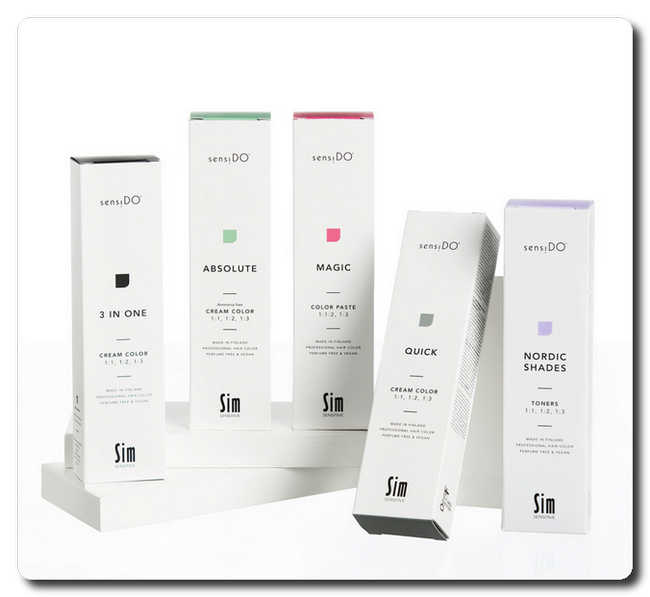
SIM Finland Oy has invested in energy efficiency and reducing carbon footprint as a part of their sustainability journey. For example, they have almost 700 solar panels installed on the roof of their factory allowing them to run the manufacturing using solar energy.
“Sustainability is an important value in everything we do, including our production, and across all parts of the value chain. When we choose our packaging materials environmentally friendliness, as well as recyclability, are important factors. The finished print result also plays an important role as pleasing and eye-catching aesthetics have great importance for cosmetic packaging,” says Heidi Varjoranta, Sales & Marketing Manager at SIM Finland Oy.
“The renewed packaging has a lot of white space and therefore the paperboard had to be pure white. Thanks to the high brightness of MetsäBoard Pro FBB Bright the Pantone® colours were reproduced accurately, both on the top and the reverse side of the board. The printing was finished with a matt varnish that was enhanced by the excellent surface of the paperboard,” says Lauri Raumanni Sales Manager at Grano Oy, the converter of the packaging range.
MetsäBoard Pro FBB Bright is made of fresh fibres 100% traceable to their origin in sustainably managed Northern forests, and available with PEFC™ or FSC® certification.
Stoelzle Glass Group awarded Ecovadis GOLD
We are honoured to communicate that Stoelzle Glass Group has been awarded GOLD status by the renowned ECOVADIS platform. This is an important recognition of our steadily increasing efforts and measures undertaken in the field of sustainability over the past years.
According to the strict Ecovadis Methodology, which is based on international sustainability standards such as Global Reporting Initiative, United Nations Global Compact, and ISO 26000, Stoelzle Glass Group ranks within the top 4% of all Glass Manufacturers assessed by Ecovadis.
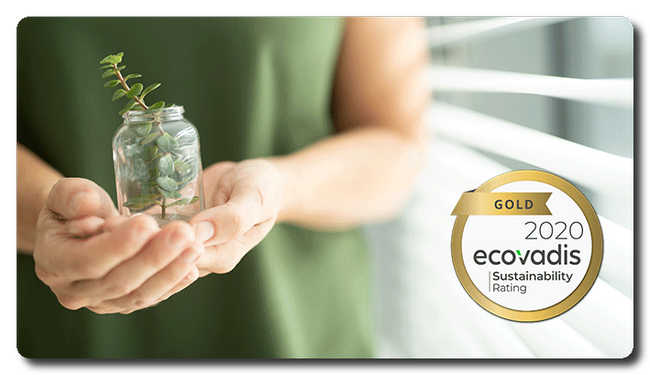
“We are proud about our promotion to the Ecovadis Gold status. This remarkable rating results clearly from our success in reaching a couple of important sustainability milestones, such as the certification according to ISO5001 and ISO14001, the publication of our 2nd GRI based Sustainability Report, our Group-wide Code of Conduct, as well as the successful implementation of a Sustainable Supply Chain Management,” underlines Georg Feith, CEO of the Glass Group.
Stoelzle Glass Group is certainly one of the most engaged and most advanced glass manufacturers in CSR among the 60,000 companies from all branches assessed by EcoVadis worldwide. We constantly strive to improve our processes, technologies and machines in order to contribute significantly to reach the European Green Deal goal to be climate neutral. In this respect, Stoelzle takes also part in the Furnace of the Future Project: Together with several European Glass Plants we work on the development of a high-capacity hybrid electric furnace, which will be able to reduce furnace emissions by 60% and use 80% of electricity from renewable sources, replacing combustion of natural gas.
In addition to all these eco-friendly initiatives, Stoelzle sets also great score on labor & human rights, and has committed themselves to embed firmly their ambitious Code of Conduct, valid for all their employees, and the whole Supply Chain, too, in their company culture.
Pandemic cannot mean sustainability takes a back seat warns packaging giant
Packaging giant DS Smith is warning brands and retailers that the Covid-19 pandemic does not mean they can overlook their environmental efforts after European research shows that shoppers continue to prioritise sustainable packaging.
- New European research shows that the Covid-19 pandemic has led to new shopping habits - but consumers continue to prioritise sustainable packaging
- 85% of people say they want to buy products that use as little packaging as possible
- Almost a third (29%) say they havestopped buying particular brands because their packaging was not sustainable
The new study, conducted by DS Smith and Ipsos MORI, a global leader in market research, reveals that despite the global health crisis, shoppers still have their eye on the environment; with 85% of consumers wanting to buy products that use as little packaging as possible, and almost a third (29%) admitting that they have stopped buying particular brands altogether because their packaging was not sustainable.
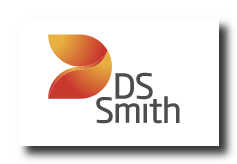 The analysis was carried out among 9000 respondents across 12 European countries and shows that while shopping habits may have changed, sustainability continues to be key.
The analysis was carried out among 9000 respondents across 12 European countries and shows that while shopping habits may have changed, sustainability continues to be key.
The pandemic has led two thirds (68%) to agree that they try to spend as little time in-store as possible, and has prompted sizeable growth in e-commerce. It is important therefore to note that half (48%) of online shoppers say they have received ‘unsustainable’ e-commerce packing, and one in five (22%) say they have stopped buying from some online retailers because the packaging they sent was not sustainable.
Stefano Rossi, CEO DS Smith Packaging commented: “We’ve spent the last eight months helping our customers adapt to a seismic shift in consumer behaviour and the ever-evolving challenges of the pandemic. As a leader in innovative packaging solutions we need to understand how consumer attitudes change to be able to best serve our customers and society. This new research not only reveals what has changed because of Covid-19, it also shows what priorities have endured and that sustainability is still front of mind for consumers across Europe. Retailers and brands need to embrace sustainable packaging at such an important time to ensure they reap the environmental and consumer benefits.”
Hygiene is another concern for consumers withmore than half (57%) saying they wash their hands thoroughly after touching e-commerce packaged products and 30% throw packaging away more quickly - highlighting the need for visible, straightforward disposal information.
56% of shoppers now worry about how many people have touched in-store products (78% in Portugal, 68% in Spain and 65% in the UK). As a consequence, some choose items from the back of the shelf which people are less likely to have touched.
One in three (33%) also wash or disinfect all loose items such as fruit and vegetables and 12% now avoid buying loose unpacked goods (22% in Finland and 19% in the UK). In response to this, DS Smith has developed a host of new innovative packaging designs such as corrugated punnets for fruits and vegetables, eco-boxes for eggs, and handling solutions for bottles and dairy products.
DS Smith expects the need for new sustainable packaging solutions will rise in the coming months, with the company continuing to applyits Circular Design Principles - developed in collaboration with the Ellen MacArthur Foundation - to design high-performing, circular packaging solutions to meet the evolving challenges of the marketplace.
The principles reflect DS Smith’s aim to use packaging and recycling to enable the circular economy, a goal laid out in its recently launched Now and Next Sustainability Strategy. Two of the company’s focus areas are to offer 100% reusable or recyclable packaging and to replace problem plastics with sustainable alternatives.
More details on DS Smith’s sustainability strategy can be found here.
Access to the report can be found on the DS Smith website here.
About DS Smith:
DS Smithis a leading provider of corrugated packaging worldwide, supported by recycling and papermaking operations. Headquartered in London and a member of the FTSE 100, DS Smith focuses on creating innovative sustainable packaging solutions in 34 countries employing around 30,000 people. Using the combined expertise of its divisions – including Packaging, Recycling, Paper – DS Smith works with customers to deliver solutions that reduce complexity and deliver results throughout the supply chain. Its history can be traced back to the box-making businesses started in the 1940s by the Smith family.
ABOUT THE RESEARCH
DS Smith partnered with the world-leading research company Ipsos MORI to conduct the consumer research. Ipsos MORI interviewed an online sample of 8,500 adults aged 18-65 in the UK, France, Poland, Germany, Italy and Spain, Belgium, Denmark, Finland, the Netherlands and Sweden and 500 adults aged 18-55 in Portugal, between the 24th September and the 19th October 2020. Data has been weighted to the known offline population proportions for age, gender, region and working status within each country.
Greater flexibility, safety and productivity – and fully automatic
Automated industrial trucks offer a wide range of clear advantages. Linde Material Handling has updated its comprehensive product range and is pleased to present the second-generation Linde R-MATIC reach truck and an additional Linde L-MATIC HD model. The experience Linde has gained from past projects involving over 50 vehicles has gone into the further development of its reach trucks. The resulting performance characteristics ensure greater productivity, safety and flexibility.
Pallet warehouses play a central role as material buffers both in industrial manufacturing processes and in distribution centers. Storage and retrieval operations in high-bay racking systems are usually standardized processes entailing a high degree of repetition. As a rule, the narrower the distances between the rows of shelves and the more precise the positioning of the individual pallets, the more efficient the warehouse. This is exactly what makes pallet storage systems the ideal field of application for automated equipment such as the Linde R-MATIC reach truck and the Linde L-MATIC HD pallet stacker.
The new Linde trucks can work with maximum precision even in the tightest of spaces: With a length of 2,520 millimeters and a width of 1,565 millimeters, the Linde R-MATIC (1.6-ton load capacity) is the only automated hybrid reach truck on the EMEA-market that can maneuver in aisles as narrow as 2.90 meters. Software-controlled, the vehicle can store pallets with extremely high accuracy even at lifting heights of more than eleven meters. “The design, maneuverability, load handling and precision of these automated industrial trucks are decisive for the performance of the overall system,” says Alexandra Mertel, Product Manager Automation & Intralogistics Solutions at Linde Material Handling: “These criteria are crucial for enabling the pallets to be placed precisely at the intended storage locations and for pick-and-drop cycles to be improved.”
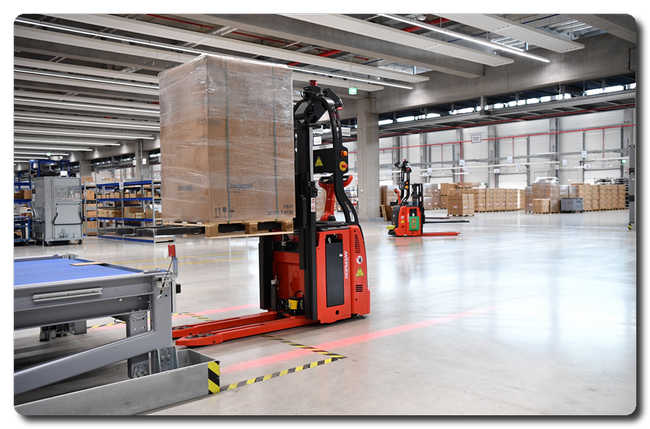
With the help of an infrastructure-free laser navigation system, the trucks dynamically steer their way through the warehouse, receiving transport orders directly from the warehouse management system via the central control unit.
The trucks receive a noticeable productivity boost from the auto-calibrating 3D camera that is equipped with a new software generation. Not only does this camera recognize the dimensions of the pallet markedly better, it can also see deeper into the pallet, which makes picking up the pallet and placing it down much more precise – whether on the ground, on roller conveyors or on the shelves. At the same time, the automated vehicles are able to transport a greater variety of pallets. This is ensured by relative image recognition algorithms developed exclusively for Linde Material Handling that have been validated in extensive tests.
As is standard practice at Linde Material Handling, the automated trucks meet the highest safety requirements. Four scanners are integrated into the vehicle at floor level, producing a 360-degree safety field around the vehicle and constantly screening for obstacles. The standard equipment also includes additional emergency stop switches, the well-known Linde Blue Spot and the Dynamic Mast Control system, which provides valuable assistance at great lifting heights. Optionally available equipment includes a sensor that detects overhanging loads and a second, higher-positioned 3D camera that can generate time savings in load handling.
The two Linde L-MATIC HD models with 1.6- and 2.0-ton load capacity feature all around safety equipment as well, including side bumpers, standard and optional scanners, emergency stop switches and optical and acoustic warning systems. Here too, load detection is via the innovative 3D camera.
Reach trucks and pallet stackers are designed as a hybrid solution, allowing the operator to take control of the truck at any time and switch to manual mode. Another new feature is the autonomous charging ability. Equipped with fast-charging batteries, the automated industrial trucks drive to the charging station independently for recharging.
“In addition to the appropriate technology, a provider’s consulting expertise also plays a decisive role in automation projects,” says Product Manager Alexandra Mertel from Linde Material Handling. In order to find a suitable solution for a particular customer, numerous parameters must be checked during the planning stage. “We first need to completely understand the customer’s expectations. Only then can the system be developed and the trucks configured in detail.” Here, specialists from Linde Material Handling work closely with different departments on the customer side (e.g. Purchasing, Logistics, Engineering). “For this purpose, we have set up our own implementation team to ensure the reliable commissioning of the vehicles. This enables us to provide comprehensive support to our customers,” emphasizes Mertel.
Frasers Group invests in Quadient’s high speed automated packaging technology
Quadient (Euronext Paris: QDT), a leader in helping businesses create meaningful customer connections through digital and physical channels, announced today that it is to supply retail giant, Frasers Group, with its latest CVP Everest fit-to-size automated packaging system – capable of tailor-making 1,100 right-size ecommerce packages per hour.
Frasers Group will use Quadient’s most advanced automated packaging system to build exact-sized packages for individual ecommerce orders, single or multiple items, across its premium brands.
The CVP Everest is to be installed in early 2021 at Frasers Group’s distribution centre in Shirebrook, Derbyshire. Three separately branded cardboard feeds to the machine will enable the retailer to pack multiple brands in one seamless flow.
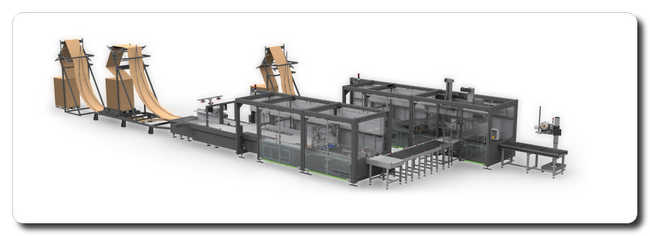
Michel Piotrowski, Head of Automation at Frasers Group, says: “The customer experience is of critical importance to us and the quality, sustainability and performance of the packaging we use plays a major part in the customer’s perception of our brands. The CVP Everest delivers on our principle goals – to reduce waste by producing premium packages that are perfectly sized to the order, to use sustainable packaging materials and to improve vehicle utilisation by getting more packages into a vehicle, which in turn reduces our CO2 emissions.”
Jo Bradley, Business Development Manager for Quadient in the UK, says: “We are delighted that Frasers Group has decided to adopt our most advanced packaging system, the CVP Everest. Environmentally aware consumers are increasingly choosing to buy from retailers that demonstrate their commitment to the environment. Making each package the exact size needed to firmly hold and protect the ordered items cuts down on wastefulness of materials and the high carbon-cost – and financial cost – of transporting air.”
The CVP Everest is a high speed automated packaging solution. The system measures, constructs, seals and labels each parcel in a seamless process – reducing package volumes by up to 50%, cutting cardboard usage by 30% and eliminating the need for void fill. As the CVP Everest makes each package specifically to the size of the individual order, the customer experience is enhanced and trailer volumes are massively reduced – saving transport costs and CO2 emissions.
About Quadient®
Quadient is the driving force behind the world’s most meaningful customer experiences. By focusing on four key solution areas including Customer Experience Management, Business Process Automation, Mail-Related Solutions, and Parcel Locker Solutions, Quadient helps simplify the connection between people and what matters. Quadient supports hundreds of thousands of customers worldwide in their quest to create relevant, personalized connections and achieve customer experience excellence. Quadient is listed in compartment B of Euronext Paris (QDT) and is part of the CAC® Mid & Small and EnterNext® Tech 40 indices.
For more information about Quadient, visit quadient.com.
Ardagh Group partners with Parkway Brewing Company to supply all of the brewery’s glass beer bottles
Ardagh Group, Glass – North America, a business unit of Ardagh Group, has partnered with Parkway Brewing Company to manufacture all of its 12oz long-neck glass bottles in the U.S.
Established in 2012, Parkway Brewing is one of Virginia’s premier breweries, producing upwards of 7,000 barrels per year. Known for its solid traditional beers like Get Bent Mountain India Pale Ale, Parkway continues to innovate and produces more than 30 beers per year.
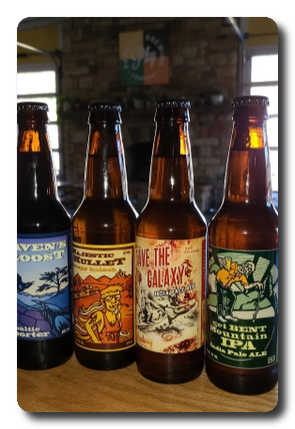 “Parkway Brewing believes that glass bottles are timeless,” said Mike Pensinger, General Manager/Brewmaster for Parkway Brewing. “While we do can some of our beers, we have always put our flagship beers in bottles and don’t plan to stop anytime soon.”
“Parkway Brewing believes that glass bottles are timeless,” said Mike Pensinger, General Manager/Brewmaster for Parkway Brewing. “While we do can some of our beers, we have always put our flagship beers in bottles and don’t plan to stop anytime soon.”
Ardagh enjoys collaborating with craft brewers like Parkway Brewing Company to create glass beer bottles that have great shelf appeal and brand differentiation in a premium, sustainable package.
“Parkway Brewing Company’s passion for supplying quality and consistency in their beer aligns perfectly with Ardagh’s dedication to manufacturing high-quality glass packaging,” said John T Shaddox, Chief Commercial Officer for Ardagh’s North American Glass business unit. “Ardagh enjoys working with craft breweries to achieve their sustainability targets by supplying eco-friendly glass bottles.”
For more than 125 years, Ardagh has been producing 100 percent and endlessly recyclable glass bottles in the U.S. and offers a wide selection of glass beer bottles in a variety of colors, sizes, styles and finishes.
Ardagh Group is dedicated to the craft beer market with capabilities and resources to grow with brands every step of the way. For glass bottles in less than truckload (LTL) or truckload quantities, contact Ardagh Group directly at 636-299-5495 (Central), 856-455-2137 (East), 707-200-9350 (West) or This email address is being protected from spambots. You need JavaScript enabled to view it..
The 100 percent and endlessly recyclable 12oz long-neck amber beer bottle is available for purchase in Ardagh’s stock catalog. To view Ardagh’s extensive glass beer bottle stock portfolio, which are all made in the U.S.A., visit ardaghgroup.com/beer2020.
Ardagh Group is a global supplier of infinitely recyclable metal and glass packaging for the world’s leading brands. Ardagh operates 56 metal and glass production facilities in 12 countries, employing more than 16,000 people with sales of approximately $7bn.
Parkway Brewing is a locally owned brewery located in Salem, VA producing 7,000 BBL’s of craft beer per year. Veteran managed, it employs 30 people in its production facility, retail taproom and external sales staff.
ANTALIS PACKAGING - INVESTING IN THE PACKAGING DESIGNERS OF THE FUTURE
With demand for packaging solutions growing ever higher, investing in the right people is as important as investing in the right products and solutions. That’s why Antalis Packaging’s internship opportunities are proving fruitful for both the company and its recruits.
Antalis’ Smart Packaging Centre (SPC) is just over two years old and there has been a growth in demand for the centre’s services - one of the key elements of which is packaging design.
 “We were delighted at just how popular the SPC has proved to be,” explains Packaging Technology Manager, Jason Poxon, “It means that we need to keep investing in, and recruiting new packaging designers to help with this demand.”
“We were delighted at just how popular the SPC has proved to be,” explains Packaging Technology Manager, Jason Poxon, “It means that we need to keep investing in, and recruiting new packaging designers to help with this demand.”
Antalis approached Nottingham Trent University with an internship opportunity for their BA Product Design students. After pitching the internship to around 200 students at the university, Jason received 38 applications from which Zoe Donaldson was one of the first interns selected.
Jason’s explains his approach, “I give our interns free rein to think about a project as I don’t want them to feel encumbered by historical solutions.” It’s an approach that seems to work well as one of our current interns designed, pitched and won a piece of work within two months of joining. Jason continues: “They have a huge amount of enthusiasm and ideas, which is exactly what’s needed when problem solving packaging.”
The investment Antalis is making in providing its packaging design internship is paying off for both parties. Now back at university to complete the final year of her degree, Zoe already has a job offer from Antalis under her belt. Zoe says that she would encourage any design student to consider packaging as a career. Zoe commented: “The world always needs packaging, and the industry is always pushing forward with new sustainable, creative and cost-effective materials, equipment and ideas, providing an exciting opportunity for any young designer.”
The future for Zoe and for Antalis’ two current interns looks particularly exciting following the recent announcement of Antalis’ acquisition by KPP (Kokusai Pulp & Paper) Group, a move that confirms its worldwide leadership as a distributor in the packaging sector and enables Antalis to benefit from new resources, strengthening its position and supporting its long-term financial structure.
